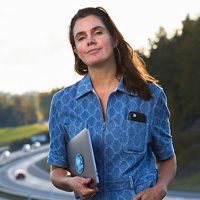Launch of Road2Science 3.0
By stepping into phase 3.0, Road2Science becomes a node within the Swedish Competence Centre in Road Technology. Through knowledge acquisition and skills development, it aims to maintain and build the road network and infrastructure of the future.

KTH's President Anders Söderholm has decided to establish Road2Science 3.0 (R2S 3.0), which will now function as a node within the new Swedish Competence Centre in Road Technology.
Road2Science 3.0 will link new and relevant KTH activities to the centre, stimulate research proposals from the KTH node and actively engage KTH researchers and its partners.

Furthermore, Road2Science 3.0 will be dedicated to addressing the four identified GAPS collaboratively established with industry during earlier phases of the Center's development. Among these, a pivotal inquiry revolves around strategies to mitigate risk aversion within road infrastructure and cultivate an environment that appeals to the creativity and ingenuity of the next generation.
- As Road2Science 3.0, with our history of fostering creativity and successful structural development, we are glad to actively uplift the national competence alongside our partners. Together, we aim to advance our collective expertise, driving impactful progress in infrastructure development. Simply said: bringing science to the road!, Centre Director Nicole Kringos says.
Adapting the road network to new conditions
As a result of climate change, rapid technological development, and increasingly heavy traffic on Swedish roads, the future road network will face significant challenges. The purpose of the Competence Centre in Road Technology is to ensure the possibility of building a stable infrastructure and a road network that can cope with these challenges, now and in the future.
- Embracing the full potential of creative scientists, innovations, and systemic changes is not merely an option for the future of road infrastructure—it is the imperative path towards sustainable, resilient, and forward-thinking transportation networks, Kringos emphasises.
Competence Centre in Road Technology (KVC) consists of the universities Royal Institute of Technology (KTH), Chalmers, Luleå University of Technology (LTU) and Lund University of Technology (LTU), as well as the Swedish National Road and Transport Research Institute (VTI) and the Swedish Transport Administration (Trafikverket) through a long-term, annual funding of SEK 40 million.
The centre's research gathers around the following areas: digitalisation, automation and electrification for modern road infrastructure, condition assessment and degradation models, health, environmental and climate impacts, and sustainable and resource-efficient roads.
The steering group has the following composition with term of office 2023-2032:
- Eva Gustavsson, Swedish Transport Administration (chair)
- Nicole Kringos, KTH
- Holger Wallbaum, Chalmers
- Anita Ihs, VTI
- Annika Mårtensson, LTH
- Charlotta Johansson, LTU
